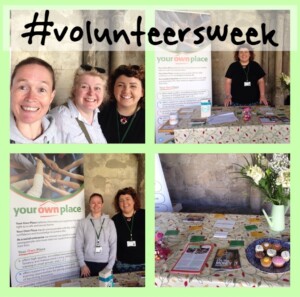Since announcing The Training Flat I’ve been stunned and delighted by the offers of help and donations. If you’re not up to speed, we’re renting a flat from Norwich City Council. In it we will be delivering our fantastic Tenancy & Independent Living Skills (TILS) courses. Just like our young people when they get their first home, it will be totally empty. So we’re working with all our stunning friends and partners to kit it out. After the initial offers of hoovers and crockery, we then had financial donations too. Last week Alex convinced a local tattoo parlour to do some artwork in the flat and Nelson’s Journey rewarded us with a TV. On Monday Rachel Blackburn from Us2U Consulting called me with the strangest offer yet! After a party at the weekend, she had some leftover sweets. She dropped off a massive bag at No8 Thorpe Road (I’ll come to them!). Sweets feature in all our courses with young people and adults alike – so we’re hugely grateful. The amazing Sarah at No8 Thorpe Road is looking after all these things until we move into the flat in August. Our friends at Heath Lodge have offered stationary, which is hugely valuable as The Training Flat becomes our first office. We’ve just been offered a TV stand as well as some money for curtain poles etc by Reality Estate Agency. And as I write this we have a tentative commitment from a flooring firm to provide laminate AND KFC have offered us all the furniture from their old restaurant on Prince of Wales Road. Wow – what a list of good will, generosity and commitment to what we do. Still lots more to collect and based on our experience so far, we’re pretty optimistic.
Blog
Brexit…
Are you tired of it? Are you drained by it? Are you bored of the politicians forgetting that life goes on for all of us that are trying to make a difference? Then I’m sorry to add to your fatigue. However, I can remain silent no longer. I’d like to make a number of points, as briefly as I can. The first is that as a third sector organisation run by human beings I don’t think I should feel afraid to express political views. All too often the sector is afraid of losing funding and remains quiet. However, we work with many that are voiceless. If we don’t raise our voices, then we do our beneficiaries a dis-service. Secondly, perhaps in the same vein, is the paucity of the debate locally and nationally in the VCSE sector. We are told to be ‘entrepreneurial, to be tolerant, to be loving’. This is business as usually as far as I’m concerned and not active enough. Complaining, being unhappy and being angry are part of the grieving process and legitimate responses that then lead to real action. And finally, and this is a more political point about the lack of social cohesion, xenophobia and other distasteful characteristics that have been highlighted this week. Are we really surprised by this behaviour? It seems to me that democracy and politics in this country, on its five year cycles and constant vying for position, is based on pitching people and communities against each other. After any period of time when some people feel let down and encouraged to turn on those around them (for example to tell on neighbours committing benefit fraud), is it really any wonder that under pressure we continue in the same vein and turn on the underdog as we perceive them? I do believe in opportunities on the horizon. However, I also believe that some responsibility has to be taken by politicians when they get round to being on control again for the behaviour and social inequalities that have lead to the result as well as its aftermath. Are they role-models for behaviour?
Mentors Making a Difference
This week I caught up with one of our mentors, (Sally) and her mentee (Christina). They’ve been meeting every fortnight for a year and meeting them both is like intruding on old friends. The picture is of a card that Christina bought for Sally to say thank you. What’s so special about the volunteer mentoring relationship is how much they both get out of it. Sally is cautious of not using cliches, but talks of how amazingly rewarding it is to unlock potential and nudge Christina to do things she wouldn’t otherwise get round to. And these aren’t small little things. These are things that if Christina hadn’t been nudged to do them, could have eventually led to homelessness. It’s clear they’re going to miss each other, but Christina also recognises the progress she’s made. I have such respect for Christina because she gave it a go and was open to the possibility of change and challenge. She’s such a convert to mentoring that she’s even agreed to help us gently persuade other young people to get involved. If you’d like to be a volunteer mentor, please get in touch.
#volunteersweek
On Sunday 5th June we joined colleagues, partners and amazing volunteers at The Norwich Cathedral Volunteers Celebration Picnic. The impact is often calculated in long reports, but anyone who has worked closely with volunteers doesn’t need a report to know the difference they make. And it’s great timing for us, as we are currently evaluating the impact of our volunteer mentors in Norwich. We’re sad that the funding for this project has ended in Norwich and working hard to secure more. It’s very inefficient to recruit and train mentors for a short-term project, only to let them go and start again when a new round of funding appears. For the moment though, let’s dwell on their successes and the difference they make. A young person describing her mentor as ‘crucial’ to her current success and ‘not knowing where I’d be without her’ says it all. We’re training more volunteer mentors for our North Norfolk and Broadland project on 7th and 8th July. If you interested in making a difference click on the link to find out more.
Going off piste
 We’ve seen a big increase recently in Tenancy & Independent Living Skills (TILS) courses being delivered 1-2-1 to young people. This is often because the young people are in college or working and can’t attend a group course. We usually travel to wherever they’re living, but are as content delivering in a coffee shop if the young person feels like getting out. What has been interesting this week is to observe three different young people. They are all roughly the same age, all leaving care locally and all moving to independence very soon. And yet their knowledge is a gulf apart. The youngest and least experienced knew most about renting privately and the oldest and most ‘worldly wise’ could barely name a welfare benefit or the circumstances in which she might claim them. Notwithstanding the extraordinary change they are about to experience by moving from their supported environment to living independently, it naturally poses challenges for us, the trainers. We have a set of tools, games and interactive techniques that must adapt to each situation, each learner and each learning style. What isn’t in doubt is just how much they get from these sessions with us. Noticeable of late isn’t that they necessarily come out as perfect budgeters or experts on Universal Credit, but that they are starting to do the thinking that’s required. They’re starting to plan. And with that they’re less anxious and dare to plan more. It’s a virtuous circle.
We’ve seen a big increase recently in Tenancy & Independent Living Skills (TILS) courses being delivered 1-2-1 to young people. This is often because the young people are in college or working and can’t attend a group course. We usually travel to wherever they’re living, but are as content delivering in a coffee shop if the young person feels like getting out. What has been interesting this week is to observe three different young people. They are all roughly the same age, all leaving care locally and all moving to independence very soon. And yet their knowledge is a gulf apart. The youngest and least experienced knew most about renting privately and the oldest and most ‘worldly wise’ could barely name a welfare benefit or the circumstances in which she might claim them. Notwithstanding the extraordinary change they are about to experience by moving from their supported environment to living independently, it naturally poses challenges for us, the trainers. We have a set of tools, games and interactive techniques that must adapt to each situation, each learner and each learning style. What isn’t in doubt is just how much they get from these sessions with us. Noticeable of late isn’t that they necessarily come out as perfect budgeters or experts on Universal Credit, but that they are starting to do the thinking that’s required. They’re starting to plan. And with that they’re less anxious and dare to plan more. It’s a virtuous circle.





